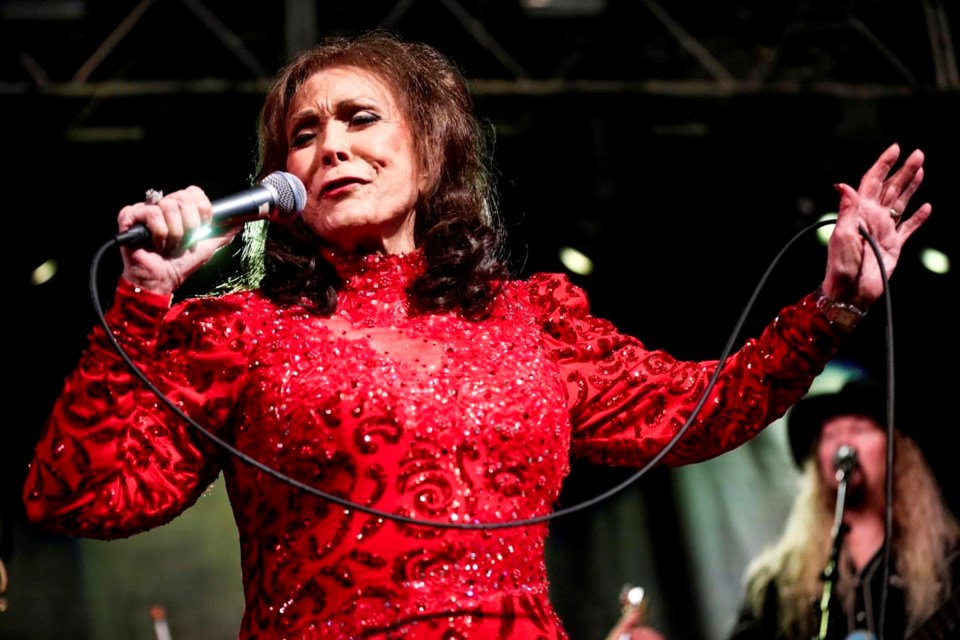NASHVILLE, Tenn. (AP) â Loretta Lynn, the Grammy-winning country music icon who lived through â and sang about â decades of advancements for women's social movements, achievements now endangered.
A mother multiple times over by the end of her teens, she gave voice to those who had historically had little control over childbirth and their own sexuality. Some of her songs reflected the lives of many rural women and mothers, lamenting their invisible labor and the repressive and gendered roles that kept them tied to a singular identity.
For some of those working in reproductive health care today in her home state of Kentucky, Lynnâs music proves all too relevant. Lynn, who sang about birth control after Roe v. Wade became a landmark legal decision protecting died only months after the U.S. Supreme Court overturned the 1973 case, creating a massive shift in reproductive rights across the country. In November, whether to eliminate the right to abortion in the stateâs constitution.
Kate Collins, 34, was not of the generation who heard or when they first played on the radio, but Lynn's voice provided a soundtrack to her childhood. In addition to growing up in a home where classic country music was part of the lexicon, Collins grew up in a family that talked about abortion and birth control, which led her to start volunteering as an escort at a clinic in Kentucky. But it wasnât until high school that she began to put together the context of what Lynn was singing about.
âShe talks about being able to wear the clothes she wants,â Collins, who now volunteers as a case manager on the abortion resources hotline, said of 1975's âThe Pill.â âBecause of my access to birth control, I could go out to bars with my friends and wear miniskirts. And that was not something I ever had to think twice about until the lyric finally hit me.â
âThe Pill,â written by Lorene Allen, Don McHan and T.D. Bayless, was recorded prior to the Roe v. Wade decision, but Lynn held onto the song for years before she felt fans were ready to listen.
âWhen we released it, the people loved it. I mean the women loved it,â she wrote in her 1976 autobiography, âA Coal Minerâs Daughter." âBut the men who run the radio stations were scared to death. Itâs like a challenge to the menâs way of thinking.â
Men in country music were singing about abortion, premarital sex and divorce in the '60s and '70s with little or no blowback, but it was rare that a woman could sing about wanting to enjoy sex with her husband without the consequences of an unplanned pregnancy, as Lynn did.
âIt is, in fact, not about anything other than control of women and their pleasure, or anyone who can get pregnant and their pleasure,â Collins said.
Lynn was frank about her experiences giving birth so young, being mentally unprepared and not physically ready. She wrote that she couldnât afford to stay overnight after the birth of her second child, so she went back home to wash diapers and draw water from the well 24 hours after delivery. She experienced miscarriages, nearly dying because she had no money to go to the doctor. And still she kept on getting pregnant, giving birth to six children.
She wrote that she couldnât even sign her own consent form to have a caesarean section because she was still a minor and â known as âDolittle or âMooney" â was out on a logging job and unreachable.
âI love my kids but I wish they had the pill when I first married,â she wrote. âI didnât get to enjoy the first four kids; I had âem so fast. I was too busy trying to feed âem and put clothes on âem.â
She said birth control was as a way for women to protect themselves: âThe feelinâ good comes easy now/Since Iâve got the pill/Itâs gettinâ dark itâs roostinâ time/Tonightâs too good to be real/Oh, but daddy donât you worry none/âCause mamaâs got the pill,â she sang.
And she did not mince words about her feelings about abortion.
âThatâs also why I wonât ever say anything against the abortion laws they made easier a few years ago,â she wrote in the 1976 memoir.
âPersonally, I think you should prevent unwanted pregnancy rather than get an abortion. I donât think I could have an abortion. It would be wrong for me," she added. "But Iâm thinking of all the poor girls who get pregnant when they donât want to be, and how they should have a choice instead of leaving it up to some politician or doctor who donât have to raise the baby. I believe they should be able to have an abortion.â
As Collins sees it, Lynn was explaining â in her own way â the idea of bodily autonomy. Collins also sees a connection between the rollback of abortion rights to the attacks on gender-affirming care for transgender people.
More than 45 years after Lynn sang about the pill, and in many other states, clinics are barred from providing abortions. While self-managed abortions using prescription medication are safe and very effective, Collins worries about desperation sinking in for those seeking help and the collateral damage of people with dangerous pregnancies or miscarriages.
âIt is really easy to feel like youâre flipping the discography back and now weâre going to go from âThe Pillâ to âOneâs on the Way,ââ she said.
___
Follow Kristin M. Hall at https://twitter.com/kmhall
Kristin M. Hall, The Associated Press



